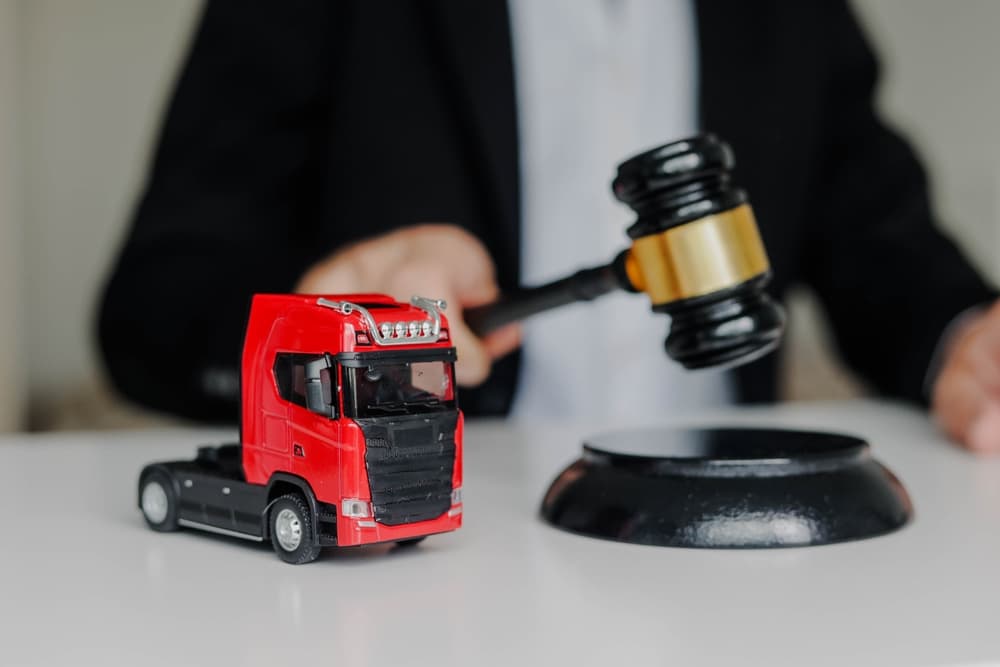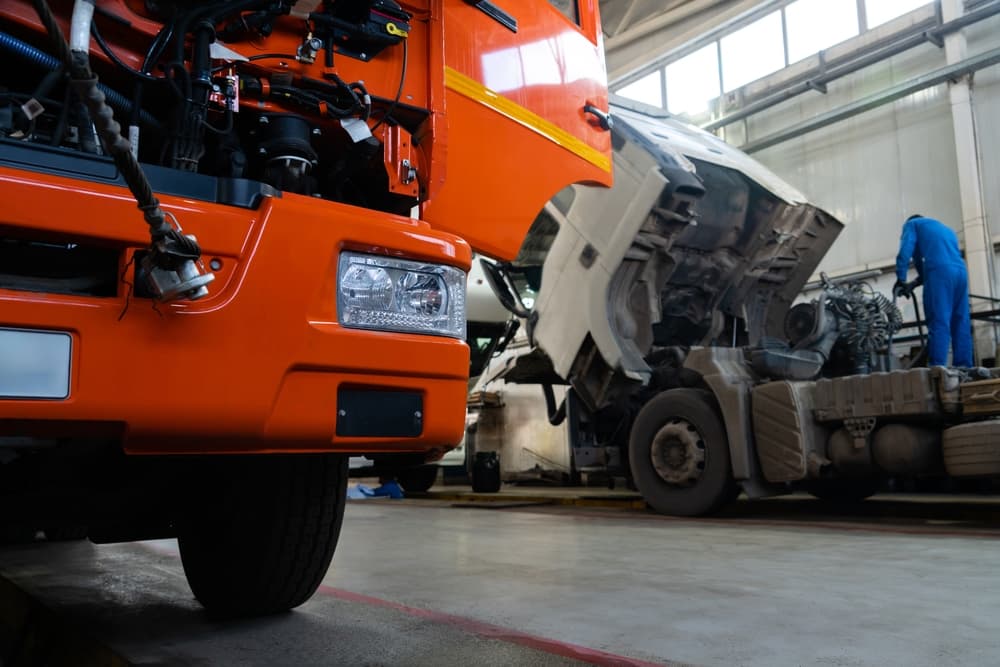
A trucking company may be held responsible when its actions or failures contribute to an accident. In many truck crashes, liability often extends beyond the driver.
The company that hired, trained, supervised, or failed to maintain its vehicles properly may share legal responsibility. Understanding this distinction can influence the outcome of a claim for individuals injured in a commercial truck collision.
Due to its central location and multiple interstate routes, St. Louis sees consistent commercial truck traffic. With the size and weight of commercial vehicles, even a single mistake can result in severe harm.
Victims often ask whether the trucking company can be held financially accountable, rather than just the driver. The answer depends on the specific facts of each case, including who controlled the driver’s activities, how the truck was maintained, and whether the company fulfilled its legal duties.
St. Louis truck accident lawyers at Gray Ritter Graham explains when a trucking company is liable after an accident and how an injured person might approach a claim.
The Legal Basis for Trucking Company Liability After an Accident
 Legal liability for trucking companies typically arises from two primary doctrines: vicarious liability and direct negligence.
Legal liability for trucking companies typically arises from two primary doctrines: vicarious liability and direct negligence.
Vicarious liability applies when a commercial truck driver operates within the scope of employment during the accident. Under this doctrine—often referred to as “respondeat superior”—an employer may be legally responsible for the wrongful acts of its employee.
Courts will determine whether the driver was actively engaged in job-related duties and whether the relationship between the driver and the company constitutes employment. If those conditions are met, the company may be liable even if the employer did not cause the accident directly.
However, the issue becomes more complex when the driver is an independent contractor. Trucking companies sometimes attempt to reduce liability by hiring drivers under contract rather than as full-time employees.
Courts review factors such as control over schedules, ownership of equipment, and company policies to determine whether the company functionally acted as an employer. If the evidence shows that the company exercised significant control over the driver, liability may still apply.
Beyond vicarious responsibility, a company may also be liable for its negligent actions. This can include failures in hiring, supervision, training, or maintenance. In these cases, the company’s misconduct, not just the driver’s, becomes the foundation of legal responsibility.
Common Failures That Trigger Trucking Company Liability
There are several ways in which a trucking company may directly contribute to an accident. These operational failures often reflect systemic problems within the organization. Below are the most common reasons a company may be held liable in truck accident claims.
Negligent Hiring and Retention
Trucking companies must conduct thorough background checks before placing drivers on the road. This includes reviewing driving records, medical fitness, and any history of substance use or prior accidents. When a company ignores or overlooks such information and hires an unsafe driver, it may be considered negligent in its hiring practices.
Retention decisions also carry weight. If a driver commits multiple safety violations while employed, the company must assess whether that person should continue to drive. A pattern of reckless driving, substance abuse, or falsified logs may put the company on notice. Continued employment despite those warnings could establish grounds for a liability claim.
Inadequate Training and Supervision
Commercial drivers require more than a license. They must learn how to operate large vehicles in various road and weather conditions. Federal regulations require companies to ensure that drivers meet minimum competency standards. When companies fail to verify this or provide adequate ongoing training, their role in the crash becomes legally relevant.
Supervision matters as well. Dispatchers and safety managers must ensure that drivers follow federal rules on hours of service, load limits, and maintenance checks. Companies that adopt a hands-off approach or ignore red flags during audits or inspections may be held legally responsible when oversight fails.
Vehicle Maintenance Failures
 Regular maintenance is necessary to keep heavy trucks safe and operational. Brake systems, tires, steering components, and trailer connections must be inspected and repaired per federal safety rules. Failure to comply can lead to mechanical failure on the road, often with devastating results.
Regular maintenance is necessary to keep heavy trucks safe and operational. Brake systems, tires, steering components, and trailer connections must be inspected and repaired per federal safety rules. Failure to comply can lead to mechanical failure on the road, often with devastating results.
In many investigations, maintenance logs reveal that inspections were skipped or warning signs were ignored. A company that delays repairs or cuts corners to meet delivery schedules may later be held liable for resulting injuries. Commercial vehicles must be in a safe operating condition before each trip. Anything less may constitute a breach of duty.
Pressuring Drivers to Violate Hours-of-Service Rules
Driver fatigue is a leading cause of commercial truck crashes. The Federal Motor Carrier Safety Administration (FMCSA) has established strict limits on the number of hours a driver can operate without rest. These rules are intended to reduce drowsy driving and encourage drivers to take required breaks.
Some companies, however, impose unrealistic delivery expectations or threaten drivers with disciplinary actions for delays. This pressure can lead drivers to falsify logbooks or skip mandatory rest periods. When a company’s demands contribute to fatigue-related errors, it may be held accountable for creating those unsafe conditions.
Documentation such as dispatch instructions, internal communications, and electronic logging device (ELD) data may be used to demonstrate how company policies created a risk of fatigue.
Improper Cargo Loading
Improperly loaded cargo can lead to rollovers, jackknife accidents, or spills. Trucking companies ensure that trailers are balanced and loads are secured according to federal standards.
Even when a third-party warehouse performs the loading, the carrier must verify that the load complies with legal and safety requirements. Failure to do so may expose the company to liability. Overloading, uneven distribution, and insecure cargo can significantly impair a driver’s ability to control the vehicle.
Proving the Trucking Company’s Responsibility in a Crash
 Holding a trucking company accountable requires evidence. This may include driver qualification files, maintenance records, electronic logging device data, internal communications, and dash cam footage. Immediate access to these records can differentiate between successful and unsuccessful claims.
Holding a trucking company accountable requires evidence. This may include driver qualification files, maintenance records, electronic logging device data, internal communications, and dash cam footage. Immediate access to these records can differentiate between successful and unsuccessful claims.
Spoliation letters sent by attorneys can direct companies to preserve relevant documentation. Once the company is on notice, any destruction of records may be considered misconduct.
In many cases, accident reconstruction experts, forensic mechanics, and commercial trucking consultants are brought in to analyze what went wrong. Their findings help establish whether the company failed to meet its legal duties.
Courts will examine whether the company followed federal safety regulations and whether its internal practices increased the risk of harm. Patterns of violations, citations from prior inspections, and testimony from former employees may also strengthen the case against the company.
Why Trucking Company Liability Matters in an Injury Claim
When a trucking company is legally responsible for a collision, the scope of financial recovery often increases. Unlike individual drivers, these companies typically carry higher commercial insurance policies.
This may allow for compensation that more accurately reflects the full extent of physical injuries, long-term treatment needs, and financial losses.
Legal action involving a company also creates the possibility of pursuing punitive damages. These are awarded in cases where the defendant's conduct exceeds ordinary negligence.
A history of repeated safety violations, record falsification, or intentional disregard for federal safety standards may warrant punitive measures. In such cases, the court aims to compensate the injured person and deter future misconduct by the defendant and others in the industry.
Additionally, companies often have access to legal defense teams and public relations resources. As a result, negotiations can be more complex than those involving only the driver. Establishing company liability early in the legal process strengthens the injured party's position and provides leverage during settlement discussions.
It also increases the likelihood that other responsible entities, such as third-party maintenance providers or cargo handlers, are investigated and added to the claim if appropriate.
Legal Options After a Serious Truck Crash in St. Louis
After a collision involving a commercial truck, people often feel confused and uncertain about what steps to take next. Medical care should remain the priority, especially when injuries are severe.
Documentation of treatment, diagnoses, and physical restrictions will later become part of the case file. The sooner this process begins, the easier it is to show how the accident affected a person’s health and ability to work.
Preserving evidence is also time-sensitive. Black box data, dash camera footage, and dispatch logs may be overwritten or deleted under routine data retention policies. Requesting that these records be preserved legally allows for a more thorough investigation. A qualified legal team can issue preservation notices immediately to prevent spoliation.
Missouri law imposes a five-year statute of limitations on most personal injury claims, including truck accidents. However, certain exceptions or circumstances may shorten that window. For example, different rules may apply if a government contractor operated the truck or if a wrongful death claim is involved. Delays in taking action can limit available legal remedies.
Individuals are encouraged to seek a review of the accident with a qualified St. Louis truck accident lawyer while the evidence remains fresh and accessible. This process allows for a more precise determination of liability and helps protect future legal options.
Choosing the Right Truck Accident Attorney to Represent You
 Legal representation can influence the outcome of a commercial trucking case. Law firms that handle these matters typically conduct their own investigations, work with subject matter consultants, and manage litigation timelines in coordination with regulatory and industry standards.
Legal representation can influence the outcome of a commercial trucking case. Law firms that handle these matters typically conduct their own investigations, work with subject matter consultants, and manage litigation timelines in coordination with regulatory and industry standards.
In the St. Louis region, familiarity with state and federal transportation laws, knowledge of local court procedures, and an established history of truck accident litigation can contribute to better outcomes.
A firm’s experience with cases involving corporate defendants, multiple liable parties, or regulatory noncompliance adds measurable value in high-stakes scenarios.
Prospective clients may consider several factors before choosing a firm: the firm’s trial history, settlement record, investigative resources, and the ability to litigate against large companies. Transparency in communication, responsiveness to questions, and clear explanations of legal strategy can also help build trust.
Choosing a firm with a strong reputation in the community, supported by verifiable results, provides confidence that the legal team has the resources and commitment to pursue full compensation.
Holding Multiple Parties Accountable in Truck Accident Litigation
Truck accident claims often involve more than one liable party. In addition to the trucking company, third-party contractors may be responsible for maintenance, loading cargo, or coordinating dispatch.
Shippers, brokers, logistics firms, and vendors may contribute to unsafe conditions. Identifying these parties and examining their involvement helps build a stronger, more complete case.
Multi-defendant litigation can lead to higher compensation by expanding the pool of available insurance coverage and financial responsibility. It also encourages full disclosure of safety practices, training procedures, and communication records among the companies involved.
A thorough investigation into all potential contributors ensures that accountability is not limited to the most visible party.
By widening the legal focus and documenting each entity's role, injured individuals have a better chance of recovering the full value of their claim through structured legal action.
Contact a St. Louis Truck Accident Attorney from Gray Ritter Graham
Trucking companies may be held accountable when their actions—or failures to act—lead to serious injuries. Whether due to poor hiring practices, vehicle maintenance issues, or pressure placed on drivers, the legal system allows victims to pursue claims against the companies responsible.
Identifying liability early, preserving the proper evidence, and working with a capable legal team can contribute to a successful resolution.
Gray Ritter Graham has represented injured individuals and their families for over 75 years. The firm’s long-standing presence in St. Louis reflects a consistent commitment to high-stakes litigation and cases involving serious injuries.
Those involved in a commercial truck crash in or around St. Louis may benefit from consulting a lawyer. An early case review helps clarify potential legal options and provides guidance tailored to the unique facts of the incident.
To learn more about how trucking company liability may apply to your situation, contact an experienced personal injury attorney at 314-241-5620. Early action may support better results and a stronger legal position as your case progresses.

 RSS Feed
RSS Feed